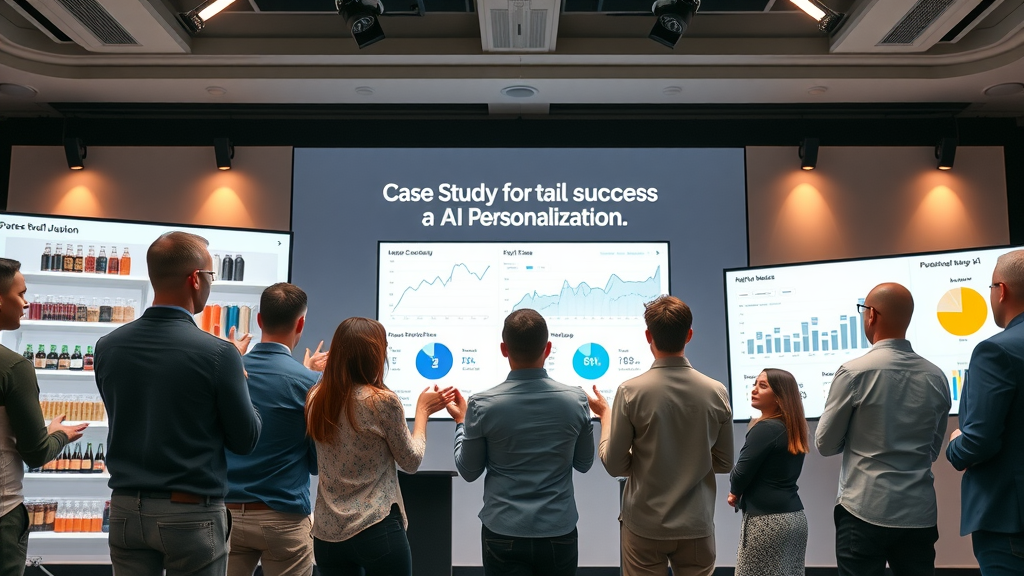Did you know that AI-driven personalization boosts customer engagement by up to 60% compared to traditional methods? Today, personalization with AI isn’t just a marketing buzzword—it’s a game-changer that’s redefining how brands connect with consumers. In this article, you’ll discover how the hidden powers of generative AI, powered chatbots, and machine learning are not only transforming experiences but are also setting new standards for what customers expect. Ready to unlock the secrets that industry leaders use to stay ahead? Let’s dive in.

What You’ll Learn
- Why AI personalization is a must-have for brands seeking growth
- How generative AI and machine learning create uniquely tailored customer experiences
- Strategies and real-world case studies to inspire your own personalization efforts
- Best practices for overcoming common AI personalization challenges
- The future trends shaping AI-powered personalization
Revealing the Unseen Power of Personalization with AI: The Startling Truth About Customer Experience
Personalization with AI is no longer optional for brands aiming to stand out in a noisy digital landscape. Modern consumers demand personalized experiences that anticipate their needs, remember their preferences, and deliver value instantly. Utilizing generative AI and machine learning , companies can analyze thousands of data points from customer behavior , social media , purchase history, and real-time interactions. This data empowers brands to deliver personalized content and product recommendations precisely when and where it matters most.
For example, a retail brand using AI personalization may tailor homepage layouts, emails, and offers uniquely for each visitor, driving higher customer engagement and satisfaction. The result? Improved loyalty, customer satisfaction , and revenue. AI-powered personalization takes the guesswork out of the equation, making every touchpoint of the customer journey feel highly personal and relevant. The truth: Brands can no longer afford to ignore AI-driven personalization —it’s the expectation, not the exception.
The Critical Shift: Why Brands Can’t Ignore AI Personalization for Enhanced Engagement
The digital marketplace is more competitive than ever before, making every interaction with customers an opportunity to stand out. AI personalization is proving to be the edge brands need for enhanced engagement because it transforms anonymous data into actionable insights. By deploying powerful AI tools that analyze real-time behaviors, interests, and individual preferences , brands can create dynamic experiences that evolve with each interaction.
Ignoring this shift means risking outdated, generic communication that fails to deliver personalized value, leading to lost customers and stagnant growth. Instead, brands that embrace powered personalization foster meaningful connections, reduce churn, and maximize lifetime value. Adapt now, and watch your customer experience transform for the better.

Exploring Personalization with AI: Transforming Generative AI Into a Customer Experience Revolution
The rise of generative AI is fueling a revolution in the way brands approach customer experience . These systems are capable of learning from massive troves of customer data —from browsing patterns to previous purchases—and transforming them into deeply relevant, context-aware personalized interactions . It’s not just about remembering a customer’s name; it’s about predicting needs, delivering timely product recommendations , and making every interaction feel tailor-made.
This technological leap comes as McKinsey & Company reports,
"Brands using AI-driven personalization saw a 20% uplift in customer satisfaction—McKinsey & Company"customer journey
Personalized Experience Redefined: Real-World Examples of Product Recommendations and Customer Experiences
Consider online retailers like Amazon and streaming platforms like Netflix—both are pioneers of AI personalization . Their engines analyze vast data points from user behavior and preferences to deliver highly accurate product recommendations or content suggestions. This isn’t just about upselling; it’s about creating a personalized experience that builds trust and loyalty.
Other brands now use powered chatbots to provide real-time, contextual customer support, answering questions, resolving issues, and even recommending new products based on previous interactions. These chatbots, driven by machine learning and generative AI , can adapt to each individual, forming the backbone of modern customer experiences that feel human, not robotic.
| Aspect | Traditional Personalization | AI-Powered Personalization |
|---|---|---|
| Data Sources | Limited (e.g., demographics) | Rich (behavioral, real-time, contextual, social media, etc.) |
| Speed & Scale | Manual, slow, limited to segments | Automated, real-time, unlimited individuals |
| Accuracy | Broad strokes, generalizations | Highly targeted, individual preferences |
| Customer Engagement | Moderate | High - meaningful, context-aware |
| Main Tools | Email, web segmentation | Machine learning, generative ai, powered chatbots |
AI Personalization: The Engine Behind Powered Personalization and Superior Customer Engagement
At the heart of powered personalization lies AI personalization , a robust engine that interprets, predicts, and responds to user intent in real-time. By drawing from machine learning models, AI systems adjust content, messaging, and recommendations with precision and speed impossible for human teams to match. This shift means customer experiences can now evolve dynamically, making every interaction as relevant as possible.
Unlike traditional methods, AI’s ability to process massive volumes of customer data allows for continuous optimization. Brands leveraging this technology observe not just incremental but exponential increases in customer engagement , loyalty, and lifetime value. It’s a seamless fusion of technological sophistication and human insight, resulting in consistently delightful, impactful experiences.

From Data to Delight: How Machine Learning and Generative AI Drive Personalized Experiences
Machine learning and generative ai represent a pivotal advancement in delivering truly personalized experiences . These models detect subtle patterns across millions of data points —from time spent on a page to intricate purchase histories—enabling brands to predict what a user may want before they even know it themselves. This proactive approach converts raw customer data into actionable insights that drive curated offerings, messages, and content.
For example, an AI tool may use real-time browsing and purchase data to generate highly personalized email marketing campaigns, while a powered tool can personalize website layouts to better match user interests. When done right, this synergy of artificial intelligence and human creativity results in increased customer satisfaction and engagement.
- Real-time product recommendations: Respond instantly to customer behavior with the most relevant offerings.
- Hyper-personalized content: Serve content tailored to unique user journeys, not broad segments.
- Improved customer experience: Make every touchpoint feel individualized and valued.
- Enhanced engagement rates: Increase repeat visits, time on site, and customer loyalty.
Unlocking the Power of Powered Chatbots for Customer Experiences
The advent of powered chatbots has further reshaped the landscape of customer experience . Equipped with advanced machine learning algorithms, these chatbots can conduct natural, conversational dialogues, access previous purchase histories, and even anticipate future needs. Powered chatbots help streamline support, resolve queries instantly, and deliver personalized product suggestions based on real-time customer interactions.
Through powered personalization , chatbots become more than just automated helpers—they become proactive brand ambassadors who can upsell, cross-sell, and nurture relationships at scale. They deliver personalized experiences while freeing up human agents for complex tasks, resulting in faster resolution times and satisfied customers.
Hyper Personalization with AI: Beyond the Basics to Mass Individualization
Hyper personalization moves beyond simple name-dropping or recommendation algorithms. Tapping into the true capabilities of generative ai and machine learning , it allows brands to craft tailored experiences for millions of users, at once, without sacrificing individuality. Rather than segmenting customers into broad categories, hyper personalization considers every micro-preference and context, ensuring each interaction is meaningful and timely.
Imagine logging in and seeing a homepage, product recommendation, or email campaign designed just for you—reflecting your exact tastes, history, and even mood. This level of interaction creates not just loyal customers, but brand advocates who feel deeply understood and valued.

Next-Level Generative AI: Tactics for Creating Unique Personalized Experiences at Scale
To achieve large-scale personalization, brands must adopt tactics like dynamic content creation, adaptive user interfaces, and predictive analytics. Generative AI models can create personalized content on the fly, recommend products with uncanny accuracy, and even craft individualized messages that feel highly personal.
These tactics are already transforming eCommerce, streaming media, and even email marketing . The time to invest in mass individualization is now, as brands that do will enjoy substantial advantages in engagement, conversion, and loyalty.
"Personalization with AI isn't a trend; it's the foundation of tomorrow’s customer experience."
The Personalization with AI Playbook: Effective Strategies for Marketers
Marketers aiming to deliver standout customer experiences must embrace a well-structured personalization strategy . Begin by mapping the customer journey and identifying touchpoints where AI tools can enhance relevance and engagement. Successful strategies leverage the predictive power of machine learning to recommend products, segment audiences, and automate content delivery.
Consider how the integration of powered chatbots , dynamic web content, and intelligent email segmentation creates a comprehensive, scalable solution for driving engagement. Review your customer data —every transaction, site visit, and social interaction—to inform and continually refine your approach. By staying data-driven, your personalization efforts will remain agile and effective in a rapidly changing market.

How to Use AI Personalization for Smarter Product Recommendations
- Analyze your audience data: Collect extensive customer data including browsing history, purchase behavior, and engagement on social media .
- Select your generative AI tools: Choose robust ai tools integrating machine learning and behavioral analytics for best-in-class recommendations.
- Configure personalized experiences: Use your chosen powered tool to design every step of the journey, from web content to email marketing .
- Optimize for customer experience: Test, refine, and A/B test different approaches to see what generates the highest engagement and satisfaction.
- Measure engagement improvements: Continually monitor key KPIs like click-through rates, conversion, and repeat purchases to fine-tune your personalization strategy .
Leveraging Machine Learning for Continuous Customer Experience Optimization
Continuous improvement is the hallmark of AI-powered personalization. Machine learning algorithms constantly learn from new data, updating models to reflect evolving user preferences and behavior. As customers interact with your site, app, or chatbot, real-time feedback loops enable you to optimize touchpoints and keep experiences fresh and relevant.
This cyclical process—analyze, adjust, measure, and iterate—means your personalization efforts get smarter over time. Innovative brands leverage these insights not only to boost customer engagement but also to anticipate and shape customer needs, outpacing competitors stuck in static campaign cycles.
| Platform | Key Features |
|---|---|
| Salesforce Einstein | AI-driven recommendations, dynamic customer journeys, predictive analytics |
| Adobe Sensei | Behavioral personalization, content automation, audience insights |
| Dynamic Yield | Real-time segmentation, individualized product recommendations, A/B testing |
| Optimizely | Web personalization, AI-driven content delivery, experimentation |
| Bloomreach | Personalized search, merchandising, omnichannel personalization |
AI Personalization in Action: Impactful Case Studies
The most innovative brands are already reaping vast rewards from AI personalization . Amazon, for instance, leverages machine learning to serve up relevant product suggestions that account for millions of customer data points each second. Streaming giants like Spotify use generative AI to create highly curated playlists for every user, continuously adapting to unique music preferences in real-time.
These case studies demonstrate how powered personalization not only boosts customer engagement but also drives measurable business results—more conversions, longer lifetimes, and higher customer satisfaction .
How Leading Brands Use AI Personalization to Innovate Customer Experience
Retailers like Sephora and Nike blend online and offline personalization strategies , allowing for seamless transitions between mobile apps, websites, and brick-and-mortar experiences. Their use of generative AI and powered chatbots enables product customization, real-time support, and promotions personalized to both micro and macro-trends.
This innovation has set new expectations among consumers—today, a one-size-fits-all approach can seem jarringly outdated. Instead, truly personalized interactions and customer experiences reflect the future of how brands will compete and win.
"AI doesn’t just meet expectations—it creates new ones for personalized experience."

Overcoming Obstacles in Personalization with AI: Challenges & Ethical Considerations
Despite its immense potential, personalization with AI isn’t without pitfalls. Brands must navigate issues like data privacy , algorithmic bias, and maintaining transparency with users. Consumers demand more control over their information; mishandling it risks eroding trust and damaging your brand’s reputation.
Further, the risk of over-personalization —where AI feels intrusive or manipulative—can spark backlash or disengagement. Ethical stewardship and a commitment to responsible AI are essential for both current and future personalization efforts.
Addressing Privacy, Bias, and Transparency in AI-Powered Personalization Systems
Safeguarding customer data is table stakes in today’s landscape. Brands must be transparent about data collection methods and ensure compliance with regulations like GDPR and CCPA. Bias in machine learning models can also negatively impact customer experiences if unchecked. Brands should invest in continuous monitoring, diverse training data, and explainable algorithms to maintain fairness and transparency.
- Data privacy violations
- Algorithmic biases
- Over-personalization
- Lack of transparency

Balancing Automation with Authenticity in Customer Experiences
Striking the right balance between automation and authentic human interaction is crucial. Over-automating can make communications feel cold or dehumanized, while too much manual effort is inefficient. The goal is to use artificial intelligence as an enhancer—freeing staff from repetitive tasks while empowering them to focus on creative, empathetic engagements that deepen customer relationships.
Winning brands foster authentic connections by combining the speed and scale of AI with a personal, human touch. Always aim for transparency in how you use AI, allowing customers to choose their own adventure and opt out where desired.
Future-Proofing Your Brand: The Next Era of Personalization with AI and Generative AI
The pace of innovation in powered personalization is relentless. To future-proof your strategy, brands must keep pace with emerging technologies—like voice interfaces, augmented reality overlays, and predictive analytics driven by even more sophisticated generative AI models. These tools will set the stage for richer, multi-modal engagement and even deeper brand-customer alignment.
Staying ahead means not just leveraging the latest technology, but continuously iterating on your approach, investing in staff training, and staying closely aligned with evolving consumer privacy preferences.
Emerging Technologies Fueling Powered Personalization & Their Impact on Customer Experience
Augmented reality, voice assistants, and advanced AI-driven search tools are already revolutionizing the customer experience . Brands using these technologies can deliver context-aware, immersive interactions that surpass static website or email campaigns. As AI becomes more sophisticated, expect to see even more seamless integration between digital and physical experiences—further blurring the line between online and offline worlds.
These advances expand beyond retail. Healthcare, education, and finance are all being reimagined through the lens of personalization with AI , demonstrating the vast, untapped potential across industries.
What the Future Holds: AI Personalization Trends to Watch
Key trends shaping the future of ai personalization include ( but are not limited to ): hyper-personalization powered by generative models, integration of real-time data streams for context-rich experiences, and ethical AI frameworks for trust and safety. Expect increasingly proactive, predictive recommendation engines that not just respond to but anticipate needs, and customer journeys that adapt instantly based on mood, location, or context.
Staying agile and open to innovation will allow leading brands to meet—and often exceed—constantly rising consumer expectations.

Video Section: How Personalization with AI Is Set to Change the Customer Experience Landscape
Explore a deep-dive video illustrating how leading platforms harness AI and generative AI to craft seamless, individualized customer journeys—setting the blueprint for all brands.
Video Section: Case Study – From Data to Personalization with AI in Retail
Watch a step-by-step breakdown of a retail brand’s transformation using machine learning and powered chatbots —from collecting raw customer data to rolling out highly effective personalized experiences .
Frequently Asked Questions About Personalization with AI
- What are the best tools to start with personalization with AI? Start with solutions like Salesforce Einstein, Adobe Sensei, Dynamic Yield, or Optimizely. These AI tools integrate easily and provide robust personalization, segmentation, and product recommendation capabilities for companies of all sizes.
- How does AI personalization impact customer engagement? AI personalization allows brands to serve hyper-relevant offers, content, and support, driving stronger engagement, increased conversions, and deeper loyalty. Real-time adaptation ensures customers feel valued and seen at every interaction.
- Can small businesses afford AI-powered personalization? Yes! With the emergence of affordable and scalable powered tools and SaaS platforms, even small brands can benefit from AI, incrementally building up from simple chatbots to sophisticated, omnichannel personalization.
How is AI used in personalization?
Personalization with AI: Practical Applications Across Industries
AI is disrupting nearly every industry by transforming how businesses create personalized experiences. Through powerful AI and machine learning models, brands analyze customer data , predict preferences, and deliver content or offers designed for the individual. Common applications include product recommendations on eCommerce sites, personalized playlists in streaming, and powered chatbots for instant, customized support.
In healthcare, AI diagnostics offer personalized treatment pathways. In travel, booking platforms suggest itineraries based on prior behaviors. This level of personalized customer experience drives engagement and differentiates leaders from the rest.
How is AI used in personalized learning?
Enabling Personalized Experiences in Education Through Generative AI and Machine Learning
Education is benefiting immensely from personalization with AI . Generative AI and machine learning adapt learning materials, sequences, and feedback to each student’s strengths, weaknesses, and pace. Teachers can leverage AI tools to automatically identify students needing extra help or accelerated coursework.
Adaptive assessment platforms, intelligent tutoring systems, and personalized content recommendations are all making education more effective and engaging, ensuring no two students have exactly the same learning journey.
What is an example of AI hyper personalization?
Real-World Scenarios: Generative AI Creating Hyper Personalized Product Recommendations
A fashion retailer uses generative AI to recommend not just single products, but entire outfit suggestions based on the user’s browsing history, previous purchases, social media activity, and even current weather. The system updates in real time , so as preferences change, so do the recommendations—resulting in highly personalized experiences that drive satisfaction and repeat engagement.
This same approach is now common in media streaming services, where powered personalization adapts content libraries and homepage layouts to each individual viewer—eliminating endless scrolling and introducing a delightfully curated experience.
What is the role of AI in marketing personalization?
The Marketing Revolution: AI Personalization for Customer Experience and Conversion
In marketing, AI personalization allows brands to segment audiences in real-time, deploy highly personal content across multiple channels, and optimize conversion paths for every individual. Email, advertising, and web content are no longer static or generic; they’re tailored, timely, and aligned with each user’s behavior and preferences.
This revolution results in increased click-through rates, greater conversion, and a level of customer experience that keeps brands competitive in an ever-evolving digital marketplace.
Key Takeaways: Driving Success with Personalization with AI
- AI personalization is redefining customer experience
- Machine learning and generative AI enable scalable personalization
- Powered personalization leads to increased customer loyalty
- Ethical considerations are crucial for long-term success
Ready to Transform Customer Experiences with Personalization with AI?
Start utilizing AI-powered personalization strategies today to skyrocket engagement and future-proof your brand against disruption.
Seize the AI advantage now: invest in personalization, foster authentic connections, and continually adapt your strategy to stay ahead of the curve.
To enhance your understanding of AI-driven personalization, consider exploring the following resources:
-
“How AI Personalization Is Changing the Customer Experience” : This article delves into how AI tools analyze customer data to craft content that resonates on a personal level, fostering stronger connections between consumers and brands. ( medallia.com )
-
“AI Personalization: 5 Real-World Examples & Benefits” : This piece provides concrete examples of AI personalization in action, such as Netflix’s recommendation engine and Amazon’s product suggestions, illustrating the tangible benefits of AI-driven personalization strategies. ( chatbase.co )
These resources offer valuable insights into implementing AI personalization to boost customer engagement and satisfaction.
 Add Row
Add Row  Add
Add 




Write A Comment